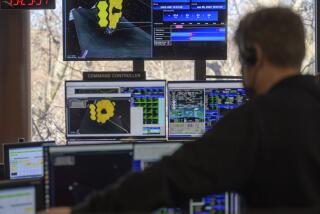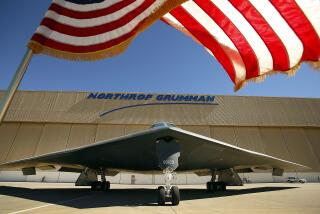TRW Board Agrees to Takeover by Northrop
- Share via
Northrop Grumman Corp. agreed Monday to acquire TRW Inc. for $7.8 billion in a deal that would create the world’s second-largest arms contractor and heighten competition amid a new era of growth for the defense industry.
The merger would provide Century City-based Northrop with the broadest portfolio of products in the defense industry, including nuclear aircraft carriers, secret eavesdropping satellites, space-based lasers, unmanned spy planes, Navy destroyers, airborne radars, battle management software and thousands of electronic systems.
TRW’s directors voted unanimously to accept a friendly pact after Northrop offered to raise its initial hostile bid by nearly $2 billion. The deal caps a takeover battle that began in February.
The acquisition, Northrop’s largest and most ambitious among more than a dozen in the last decade, would culminate its remarkable transformation from a struggling bit player in the defense industry to a powerhouse. In the process, it would surpass behemoth Boeing Co. and become second in size only to rival Lockheed Martin Corp.
“With every acquisition, the transformation has become more complete and more compelling,” said Kent Kresa, Northrop’s longtime chairman, who has presided over 15 acquisitions in the last decade. “The future is much brighter for us now.”
With TRW’s space and defense electronic operations, Northrop would become better positioned to compete for growing defense spending. The Pentagon’s budget is expected to rise by $48 billion in fiscal 2003 to $383 billion, a growth rate not seen since the Reagan administration’s military buildup.
Economists said the acquisition mirrored the changing fortunes of Southern California’s defense industry, which also has undergone significant transformation. Once largely reliant on manufacturing, the sector has refocused on technology and research.
After years of losing manufacturing jobs, the area is experiencing a surge in hiring for aerospace engineers.
Given that, the deal, which would nearly double the number of Northrop employees in the region, would solidify and could even boost the area’s position in defense-related research and development, as Northrop funnels its considerable financial resources to TRW’s leading-edge technologies, analysts said.
“I would imagine they could step in and focus the programs, reducing risk and making the programs more profitable,” said James McAleese, a defense industry lawyer who has been advising Northrop on the TRW transaction.
With the addition of about 10,000 TRW employees, most of whom work at a sprawling space and satellite technology complex in Redondo Beach, Northrop would become the region’s second-largest private employer with its headquarters in Southern California, second only to Burbank-based Walt Disney Co.
“Whether people recognize it or not, we have come charging back,” Jack Kyser, chief economist for the Los Angeles County Economic Development Corp., said of the aerospace industry. The deal “is kind of exciting because just several years ago everybody thought Northrop was takeover bait.”
Indeed, Lockheed Martin sought five years ago to acquire Northrop, the last major defense contractor to be based in Los Angeles. But the deal was scuttled because of antitrust concerns.
Unlike most acquisitions, in which companies seek cost savings by cutting redundant operations, Northrop said it had no plans to lay off TRW workers in Southern California, because there is very little overlap. Kresa said that with the country focused on beefing up homeland security and the military, employment at TRW facilities in the area could grow.
Moreover, TRW’s Southern California operations--which also include facilities in Carson and Orange and San Diego counties--are getting a psychological boost from the deal because its former boss, Ronald Sugar, is now the heir apparent at Northrop.
Kresa is scheduled to retire next year when he turns 65, the company’s mandatory retirement age. Sugar spent most of his 20-year career with TRW at Redondo Beach but was passed over for the top job at TRW and bolted to Litton Industries Inc. Last year, Northrop acquired Litton.
The timing of the acquisition could not have been better, analysts said. The deal would bolster Northrop’s position in space-based communications, missile defense and reconnaissance at a time when President Bush wants better technology for detecting, tracking and capturing potential terrorists.
Still, some Wall Street investors were nervous Monday that Northrop may have spent too much on TRW. After making an initial hostile bid at $47 a share, Northrop was forced to sweeten the deal three times: to $53 and then $58 before successfully persuading TRW directors late Sunday to consider a friendly deal at $60 a share.
Under terms of the deal, TRW shareholders would receive a higher price if Northrop’s shares were to go higher than $138 a share. Conversely, the merger price would decline if Northrop’s were to fall below $112.
In trading Monday on the New York Stock Exchange, Northrop fell $6.81 to $118.19. TRW shares declined 40 cents to $56.58.
At the same time, some TRW investors seemed dissatisfied, as they complained that the company should have held out for a better deal, analysts said.
Last week, three defense contractors--General Dynamics Corp., Raytheon Corp. and BAE North America--also submitted offers for TRW’s defense business, raising prospects for a bidding war.
But sources familiar with the bidding process said TRW directors were more interested in selling the entire company and not a portion of it. Under the latest pact, which Northrop wants to complete by end of the year, Northrop plans to spin off or sell TRW’s debt-laden auto parts business.
Although few analysts believe shareholders would reject the deal, scuttling the pact could be costly to Northrop. Should Northrop walk away from the transaction, Kresa said it would be required to pay $275 million to TRW.
Some obstacles still remain. Lockheed Martin has raised antitrust concerns with the Pentagon and Justice Department officials over the deal, saying that the combination would hurt its competitive position in making military satellites. But Kresa said Monday that he did not foresee regulators requiring Northrop to shed any businesses out of competitive concerns.
Northrop executives have been meeting with high-ranking Justice and Defense officials, asserting that the deal would actually increase competition among the large defense contractors.
“This finally creates a third powerhouse,” McAleese said. “Historically all we’ve had was Lockheed and Boeing.” If one firm didn’t want to bid a project, the Pentagon had to persuade the other to do it, he said.
The acquisition would cause two immediate casualties: employees who work at TRW’s headquarters in Cleveland and the name that has been synonymous with some of the nation’s leading aerospace research.
Upon completing the deal, contingent on shareholder approvals, Northrop plans to close TRW headquarters, affecting a few hundred employees who could be offered Northrop jobs elsewhere.
With the exception of the auto parts business, which Northrop plans to sell or spin off, Northrop does not plan to keep the TRW moniker for the remaining businesses.
“I have no emotional attachment to the name,” said Simon Ramo, a founder of TRW and the R in the company name. “I’m kind of happy with the deal because the two together is more capable and worth more than if they were separate. Names come and go.”
More to Read
Inside the business of entertainment
The Wide Shot brings you news, analysis and insights on everything from streaming wars to production — and what it all means for the future.
You may occasionally receive promotional content from the Los Angeles Times.










